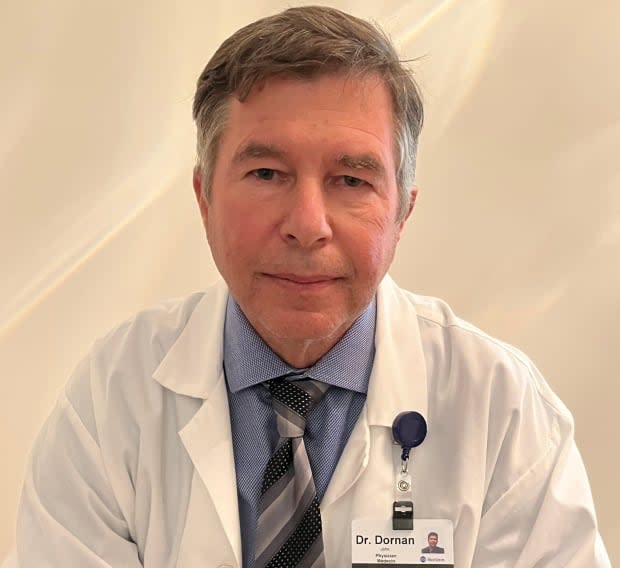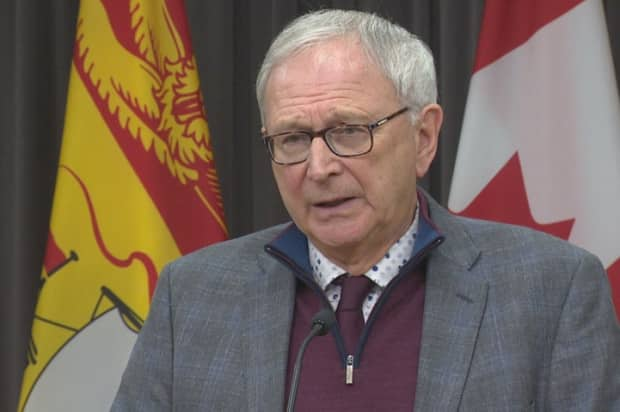Horizon CEO fired by Higgs feels vindicated but still 'in the dark' after $2M grievance award


Seven months after New Brunswick Premier Blaine Higgs fired Dr. John Dornan, the former president and CEO of Horizon Health Network, says he feels vindicated by a labour adjudication decision, but still "in the dark" about what happened.
"I think that my employer, Premier Higgs, would be the only one that knows that. And aside from a press release, he has not shared that with me," Dornan told CBC on Thursday during a telephone interview from his Saint John-area home.
It's the first time he has spoken publicly about being fired just four months into his five-year contract.
Dornan broke his silence after he won his unjust dismissal case against the province.
An adjudicator awarded Dornan about $2 million, which his lawyers say is the largest employment compensation award in the province's history.
It includes special damages representing the value of lost salary, pension contributions and health benefits for the remainder of his five-year contract, as well as $200,000 in aggravated damages for "breach of the employer's implied obligation to act in good faith when dismissing him."
"I accept the position of the grievor that his dismissal was done in a 'public, disingenuous and callous manner,'" the adjudicator wrote in his 34-page decision.
Was about to get haircut for news conference
Higgs announced Dornan's termination during a news conference July 15 in a major shakeup of New Brunswick's health-care leadership.
Higgs also replaced Dorothy Shephard as health minister and removed the boards of both Horizon and Vitalité, New Brunswick's two health authorities, citing a growing health-care crisis that included the "traumatizing" death of a Fredericton patient July 12 in the waiting room of the Dr. Everett Chalmers Regional Hospital's emergency department.
"It's not up to me to run the health-care authorities … but it is up to me to ensure that the right people are in the positions to do so," Higgs said at the time. "And it starts at the top."
According to the adjudicator's decision, Dornan testified at the hearing that an investigation into the death "concluded it had nothing to do with his management."
Although some people have suggested Dornan was made a "political scapegoat," he said he doesn't know if that's true.
He does know "it happened very abruptly" — during a phone call that lasted less than a minute.
The evidence of the grievor was that the new Minister of Health said that the 'CEO serves at the pleasure of the Minister' and 'you are no longer employed.' - George Filliter, adjudicator
When Higgs called, Dornan was in his parked car, about to get his hair cut for the Fredericton news conference Higgs had invited him and the head of Vitalité Health Network to attend the night before, following a meeting about the ER patient's death.
He said Higgs informed him during the call that Bruce Fitch had replaced Shephard as health minister. Then Fitch got on the phone, according to the arbitrator's decision.
"The evidence of the grievor was that the new Minister of Health said that the 'CEO serves at the pleasure of the Minister' and 'you are no longer employed,'" the decision states.
Had received 'good feedback'
Dornan, who previously served as the interim president and CEO of Horizon for about seven months, was "shocked."
Up to that point, he had received "good feedback" from the minister of health and "other people" he had worked with, he said.
"I felt that I was on a positive track. I had initiated many changes in Horizon and was planning on initiating other changes that I thought would help New Brunswickers."
He cites as examples increasing the number of "capable" managers and divvying up some "heavy" portfolios, "better managing" physicians and nurses by being "more respectful," and switching to Horizon-wide programs for surgery, psychiatry and emergency services.
Had plan to address shortage of primary caregivers
In addition, Dornan said he had a plan to address the province's shortage of primary health-care providers, by bringing organizations together to facilitate collaborative care team models.
As it stands, Horizon doesn't control the rules around a collaborative practice or the funds associated with that, the New Brunswick Medical Society doesn't control who is accepted and credentialed into primary care in the province, and the Nurses Association of New Brunswick deals almost exclusively with the nursing part, according to Dornan.
"My plan moving forward was to bring together people that could make decisions to say, 'Here are the new rules governing credentialing and payment and collaboration amongst primary care people.'"

Instead, without any warning, and without any constructive criticism of any possible shortcomings, or any opportunity to improve, he was fired during that brief phone call, he said.
"I acknowledged that I had been terminated and there was no other conversation after that."
According to the arbitrator's decision, Dornan was also advised during the call he would receive one year's salary in lieu of notice.
Higgs told reporters Thursday he was awaiting legal advice on the arbitrator's decision, but said he stands by decisions he made at the time, pointing to what he described as improvements in the health-care system.
'Difficult to get my head around'
The days and weeks after the firing were "difficult," said Dornan.
He had to relay the news to his wife and family, friends and colleagues, and said he had no reason to give them.
He felt he had done a "good job for health care" during his 35-year career and has received "many accolades."
"So it was difficult to get my head around."
During the July 15 news conference, CBC asked Higgs what he felt Dornan had failed to do in his four months on the job that he deserved to be fired.
Higgs declined to get into any specifics about individuals, but he did say he believed every hospital needed to have a manager of clinical services as a "gatekeeper of who's coming in, who's going out, what's the time in, how quickly are we managing that?"
"So what this reflects is that ability to get on the ground, get in a hospital and make things happen."

Dornan, 63, decided to seek legal advice because he believed that he had been terminated inappropriately and that his reputation had been ruined. He filed his grievance within days.
In his decision, the adjudicator found, "It would be reasonable for a member of the public to conclude that the Premier had concluded the grievor was responsible for this unfortunate death. Furthermore, the only conclusion to be reached from this news conference was that the announced termination of the grievor was directly related to the unfortunate death.
"In my view, these comments were made without proof and caused unjustified harm to the professional reputation of the grievor."
Dornan tried to look for other work. He had given up his role as regional chief of staff for Horizon in Saint John and reduced his endocrinology practice to one day a week when he became the president and CEO and those positions were already filled, he said.
Not having any luck locally, he interviewed for positions in other provinces. Those always seemed to start out "quite well," but fell through, he said.
Local reputation affected national employability
"Headhunters indicated that when they had spoken to people in New Brunswick, that I did not receive a positive reference," said Dornan, unable to say to whom they had spoken.
"I became aware that my reputation locally influenced my employability nationally."
Dornan said he has since asked if Horizon would consider allowing him to increase his clinical time with endocrinology patients and "they have indicated that that's a possibility.
"So I'm looking forward to a clinical practice — really what I was doing when I started in New Brunswick," he said.
"I'm glad to be back at work doing what I was trained to do as a physician and I have lots of energy and years ahead of me and I'm looking forward to that."
He admits he "would love to be leading" some of the changes in the health-care system, such as facilitating getting more primary caregivers into collaborative care team models.
But "health care in New Brunswick is not dependent on one person," he stressed.
"I think people that are in positions of authority and power could do this and, you know, I'm hopeful that over time, they will."


